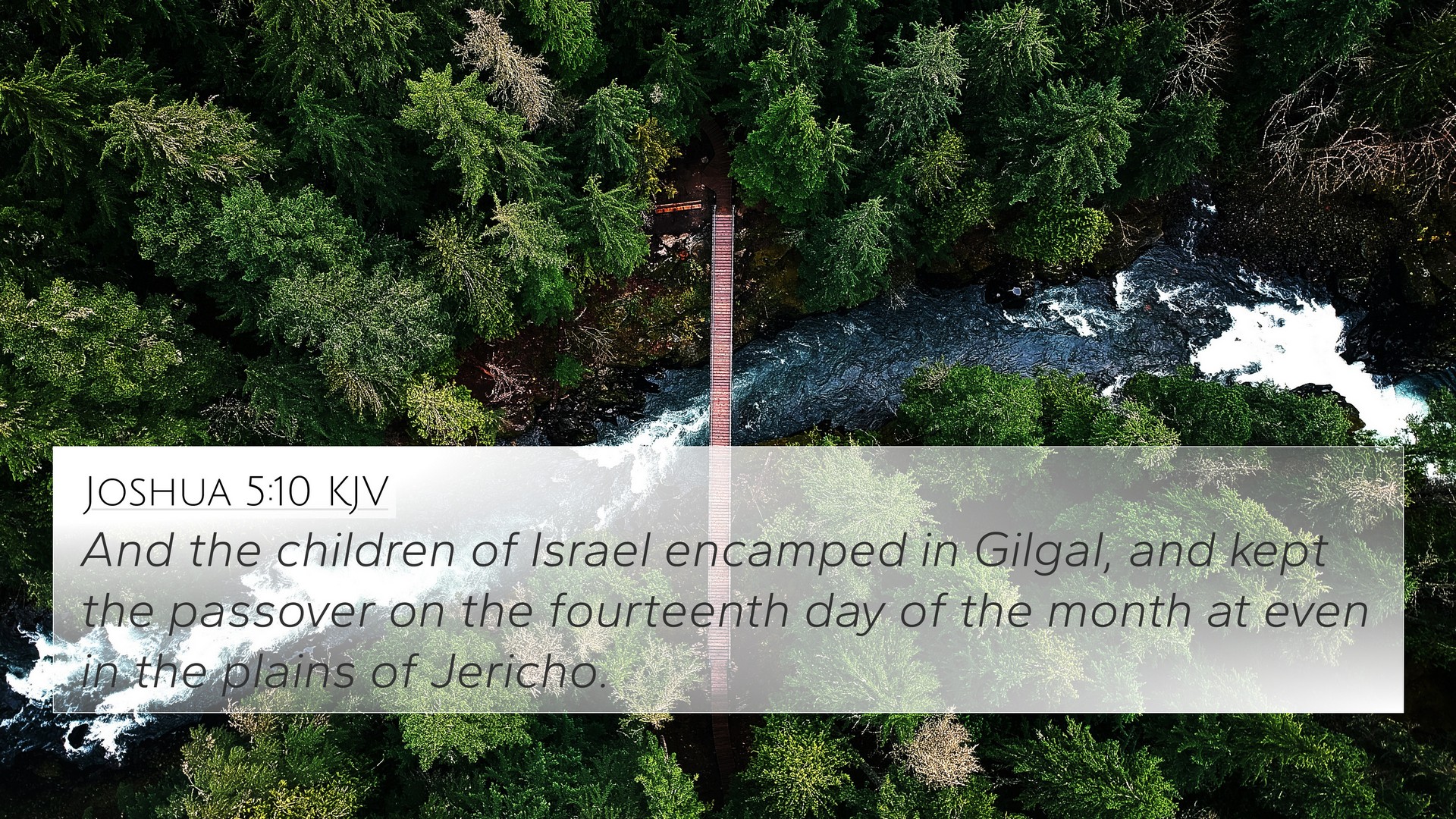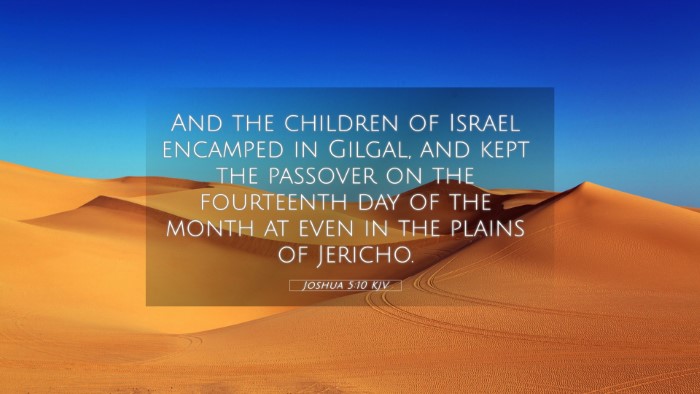Old Testament
Genesis Exodus Leviticus Numbers Deuteronomy Joshua Judges Ruth 1 Samuel 2 Samuel 1 Kings 2 Kings 1 Chronicles 2 Chronicles Ezra Nehemiah Esther Job Psalms Proverbs Ecclesiastes Song of Solomon Isaiah Jeremiah Lamentations Ezekiel Daniel Hosea Joel Amos Obadiah Jonah Micah Nahum Habakkuk Zephaniah Haggai Zechariah MalachiJoshua 5:10 Similar Verses
Joshua 5:10 Cross References
And the children of Israel encamped in Gilgal, and kept the passover on the fourteenth day of the month at even in the plains of Jericho.
Uncover the Rich Themes and Topics of This Bible Verse
Listed below are the Bible themes associated with Joshua 5:10. We invite you to explore each theme to gain deeper insights into the Scriptures.
Joshua 5:10 Cross Reference Verses
This section features a detailed cross-reference designed to enrich your understanding of the Scriptures. Below, you will find carefully selected verses that echo the themes and teachings related to Joshua 5:10 KJV. Click on any image to explore detailed analyses of related Bible verses and uncover deeper theological insights.
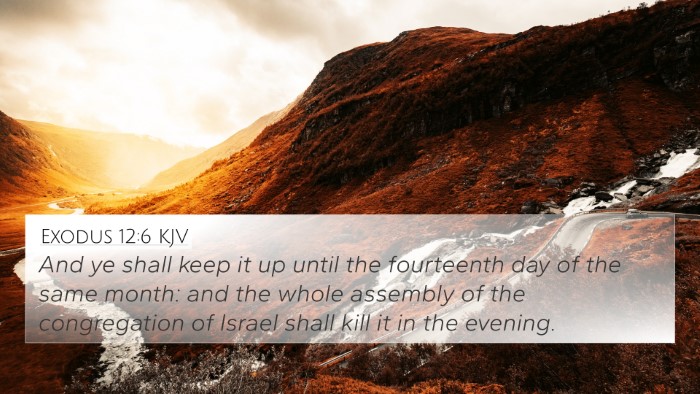
Exodus 12:6 (KJV) »
And ye shall keep it up until the fourteenth day of the same month: and the whole assembly of the congregation of Israel shall kill it in the evening.
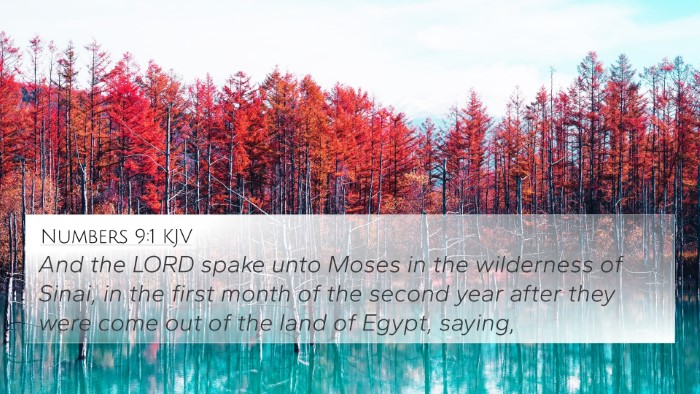
Numbers 9:1 (KJV) »
And the LORD spake unto Moses in the wilderness of Sinai, in the first month of the second year after they were come out of the land of Egypt, saying,
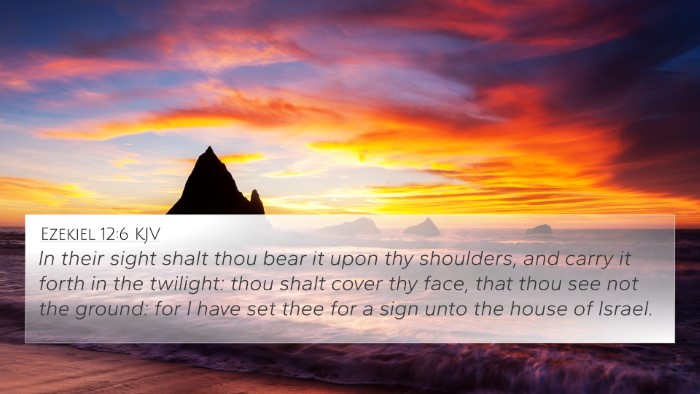
Ezekiel 12:6 (KJV) »
In their sight shalt thou bear it upon thy shoulders, and carry it forth in the twilight: thou shalt cover thy face, that thou see not the ground: for I have set thee for a sign unto the house of Israel.
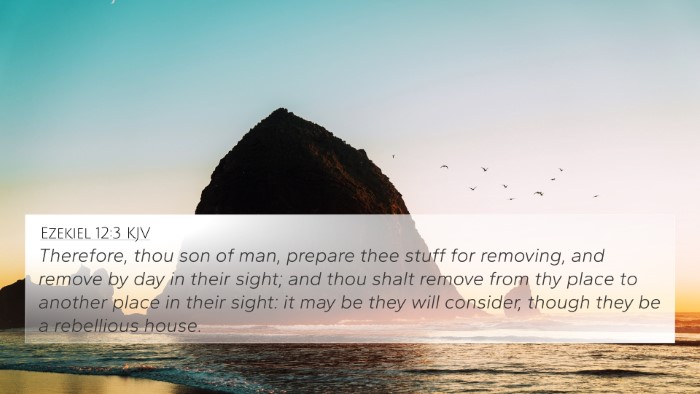
Ezekiel 12:3 (KJV) »
Therefore, thou son of man, prepare thee stuff for removing, and remove by day in their sight; and thou shalt remove from thy place to another place in their sight: it may be they will consider, though they be a rebellious house.
Joshua 5:10 Verse Analysis and Similar Verses
Understanding Joshua 5:10
Verse: "And the children of Israel encamped in Gilgal, and kept the passover on the fourteenth day of the month at even in the plains of Jericho." (Joshua 5:10)
Summary of Meaning
In this verse, we see the Israelites celebrating the Passover after crossing into the Promised Land. Their encampment at Gilgal signifies a new beginning, and the observance of the Passover is a powerful reminder of God's faithfulness, deliverance from Egypt, and the covenant established with His people.
Commentary Insights
-
Matthew Henry:
Henry emphasizes the symbolism of Gilgal, noting that the name means “rolling away,” reflecting the removal of the shame of Egypt. He highlights the importance of the Passover as a covenantal meal that marks the identity of the Israelites as God’s chosen people, signifying their integrity in remembrance of God's deliverance.
-
Albert Barnes:
Barnes notes the timing and place of the Passover, emphasizing the transition from wilderness to promise. He draws attention to the significance of the Passover ritual as a unifying act for the Israelites, which reinstituted their covenant with God and served as a reminder of their shared heritage.
-
Adam Clarke:
Clarke discusses the historical context of the Passover, linking it to Israel’s redemption from slavery. He reflects on the importance of celebrating with a community that had just experienced God’s miracles and how such observance cultivated faith and gratitude towards God.
Cross-References
- Exodus 12:1-14: Details of the original Passover instituted in Egypt.
- Deuteronomy 16:1-8: Instructions on observing the Passover in the Promised Land.
- Psalms 105:37-45: Reminds us of God's deliverance and provision for His people.
- Luke 22:14-20: The Last Supper, where Jesus institutes the New Covenant.
- 1 Corinthians 5:7-8: Christ is our Passover, connecting Old Testament themes to New Testament theology.
- Hebrews 11:28: By faith, the Israelites kept the Passover, illustrating the trust in God’s plan.
- Galatians 3:13: Christ's redemptive act links the significance of Old Testament sacrifices with New Testament salvation.
Thematic Connections
This verse highlights the themes of remembrance, community, and covenant. The act of keeping the Passover serves to remind the Israelites of their identity as God's people and the deliverance from bondage, a pivotal theme throughout Scripture that bridges both the Old and New Testaments.
Lessons and Applications
- Faith and Obedience: Just as the Israelites obeyed God's command to celebrate the Passover, we are called to observe and remember God's works in our lives.
- Community Worship: The act of coming together to observe sacred traditions strengthens our bonds within the faith community.
- Historical Reflection: Reflecting on the past, like the Israelites did with the Passover, encourages gratitude and helps us recognize God's ongoing involvement in our lives.
Conclusion
Joshua 5:10 invites readers to reflect on the significance of God's covenant with His people. By celebrating the Passover, the Israelites demonstrate a communal identity rooted in faith and remembrance, themes that resonate throughout Scripture. Anchored in the past while looking forward into the Promised Land, this verse exemplifies how we, too, should actively remember God's faithfulness in our own journey of faith.
